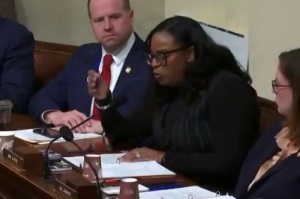The Centrality of Christ in a World Divided by Left vs. Right
We should not be talking right now. According to the naysayers who predicted Christianity's demise by the year 2000, we should not even be here.
In 1917 Communist officials declared in St. Petersburg, Russia, that by the twenty-first century the entire world would embrace Communism, and the Christian faith would cease to exist. In the 1930s the Nazi regime declared that they would outlast the followers of Jesus. In the 1960s, rock musicians – "We're more popular than Jesus now" – boasted that by the turn of the century they would receive more praise and adulation than the Father, Son, and Holy Ghost combined.
We are well into the twenty-first century. Lenin is entombed; the Third Reich is dead; The Beatles are gone, but the church of Jesus Christ is still alive and well! Why do we continue to grow, even in the midst of adversity and persecution? Simply stated, we thrive because we are centered. We are centered in a way no other movement can be. We have Christ as the center of our church.
Accordingly, the only agenda that can save American stems not from the donkey or the elephant, from the left or the right but rather, the only agenda that can save our nation is none other than the agenda of the Lamb. For the Agenda of the Lamb to go forward, we must secure the centrality of Christ. This we must do deliberately and consistently. On that first Good Friday the cross of Christ stood high on Calvary, visible to all coming and going – inescapable, central. Jesus was not then and cannot be now on the periphery. Jesus is always central.
Corresponding agenda stands contextualized in a catalytic query submitted by Christ himself.
"Who do they say I am? Who do you think I am? (Matthew 16:13–19) When Jesus came to the region of Caesarea Philippi, he asked his disciples, "Who do people say the Son of Man is?"They replied, "Some say John the Baptist; others say Elijah; and still others, Jeremiah or one of the prophets.
"But what about you?" he asked. "Who do you say I am?"
Simon Peter answered, "You are the Messiah, the Son of the living God."
Jesus replied, "Blessed are you, Simon son of Jonah, for this was not revealed to you by flesh and blood, but by my Father in heaven. And I tell you that you are Peter, and on this rock I will build my church, and the gates of Hades will not overcome it. I will give you the keys of the kingdom of heaven; whatever you bind on earth will be bound in heaven, and whatever you loose on earth will be loosed in heaven."
This biblical passage captures one of the most transformative moments in human history. Peter revealed Jesus. Jesus revealed the church, activated the purpose, and emancipated the kingdom. Revelation always leads to activation, and activation always leads to emancipation. We need a revelation of Jesus to activate our purpose as we lead a righteousness and justice movement. The Lamb's Agenda is nothing other than the agenda of Christ.
The Agenda of the Lamb demands a response to the query Christ laid before us two thousand years ago: "Who do they say I am?" Jesus was not seeking affirmation of his brand; he was not launching a multi-tier marketing arrangement; he was definitely not fretting about his reputation, or the management thereof. Rather, as often with Jesus' queries, this question would reveal more about the responder than the inquirer. Who do they say I am?
That first query is immediately followed by another: "Who do you say I am?" Those paying attention – then or now – cannot answer one question without answering the other. Of the two, the second question – "Who do you say I am?" – is much more important than the first. How we respond to the second question will determine how the world responds to the first. For if we do not know who Jesus Christ is, how will the rest of humanity ever know? The church must know who Christ is in order for the world to know who Christ is.
Too many in our church pulpits have taken a moratorium on Christian identity. Simply put, the church is not responding as Peter did. He said; "You are Christ, the Messiah, the Son of the Living God." Unfortunately, this is not the message coming from the pulpits today. The popular, politically correct American church is saying to Christ, "You are the one who makes us feel good. You are the one who makes us rich. You are the one who understands my pain." The church presents Christ as the therapist, the bank, the philosopher, the friend, the hippie, the social activist, the look-the-other-way, zero-accountability, spiritual figure.
We see the results of identity crisis all around us. Our citizens, including many self-identified Christians, worry more about raising the debt ceiling than firming up our moral foundation. They concern themselves more with helping their kids find a good college than helping them find Christ. They fret more about their savings accounts than they do about their salvation.
Why is the American collective confused about Jesus? Simply stated, the church, our church, has not set them straight. Today's current moral and cultural malaise derives from a distorted message of who Christ is. It is, however, not too late to correct that message. It never is. We can live out the Agenda of the Lamb as well as we ever could, but to do so we must reintroduce Jesus. Not the Sunday morning TV feel-good Jesus, not the politically correct Jesus, not the loving hippie Jesus, not the wise philosopher Jesus.
When Jesus asks today, "Who am I?" it is time for a church of Peters to stand up and shout, "You are the Christ – the anointed one!" We need not only to tell the world Christ is the anointed one. We need to remind them of that again and again.
Anointed to do what? Christ is not only anointed. He is the anointing. He brings good news to the poor, freedom to the captive, sight to the blind, words to the mute, hearing to the deaf. Christ brings good news, and he is good news.
More importantly, Jesus is the Christ, only Jesus is the Messiah. As we learn in Acts 4:12, "Salvation is found in no one else, for there is no other name under heaven given to mankind by which we must be saved." Jesus is not just a counterculture revolutionary, and he is not a hippie on a cross. He is the Messiah. He is the Light of the world. He is the Word made flesh. He is the way, the truth, and the life. He is the Messiah, conqueror, Son of man and Son of God. He is the Alpha and Omega, King of kings, Lord of lords, and Host of hosts.
When asked, Peter did not identify Christ as the son of a god or a dying god. No, Peter declared Jesus "the Son of the Living God." Why did Peter not just say "the Son of God?" Why did he have to add an extra modifier? The Holy Spirit directed his answer. Peter said living. This is critical.
The Holy Spirit, acting through Peter, wanted the world to know that Christ is the Son of the living God. This was not some dead, buried, marble statue, museum-type God, but the living God.
Respectfully, the question must be asked, "If he is a living God, what kind of church should we be?" What kind of Christians should we be? What kind of families should we grow? What kind of language should we speak? What kind of thoughts should we have? What kind of life should we live? Jesus tells us himself in John 10:10: "I have come that they may have life, and have it to the full."
Tangentially, we stand surrounded by a culture of death and dying: dying communities, dying economies, dying families, dying faith, dying morals, dead dreams. Everything seems to be dying around us. Yet the Lamb's Agenda sparks life. It is time to celebrate the living. It's time to re-introduce to America God. Not just to any god, but to the living God, a living gospel in a living church.
In the critical passage above, Jesus looked at Peter and said, "Blessed are you, Simon son of Jonah, for this was not revealed to you by flesh and blood, but by my Father in heaven. And I tell you that you are Peter, and on this rock I will build my church."
You see, when we reveal who God is in our life, God reveals to us our true identity. Typically, we get it all backward. We are inclined to pray, "If you fix my life, if you fill my life, then I will serve you." No, if we follow him, call upon him, grab hold of him, then he will reveal our true purpose. We must go first. If we reveal him, he will reveal us. If we praise him, he will pull us out. If we lift him up, he will lift us up. When we reveal the Christ, he reveals the Christ purpose in us.
Consequently, upon the revelation of Jesus as Christ and the Son of the Living God, Jesus said, "I will build my church, and the gates of Hell will not overcome it." The gates of hell will not, cannot, shall not, may not prevail, defeat, obstruct, overcome, or conquer the church of Jesus Christ! This cross-contextualized, church-led movement will only succeed if Christ is reintroduced in America as the Son of the Living God. It is time to stop praying for God to come down and to start telling the church to rise up.
For at the end of the day, the solution to our current malaise lies not in the right or the left but in the center; not the political center but the prophetic center; the centrality of Jesus Christ, the hope of glory.



























